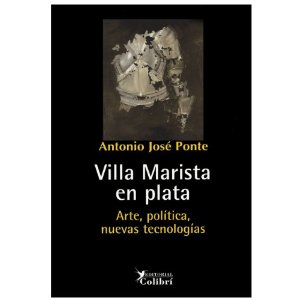Even for an uneducated Customs official, to whom the name of Antonio José Ponte means nothing, a book titled Villa Marista Exposed would stop the inspection line, given that Villa Marista is the headquarters of Cuba’s security services. But the official was more jealous of my gluten-free sausages — so beautiful in their vacuum packaging and their label of the English Court — than of the contents of that suitcase filled with books. She took home my ham and my sausages and I took home my books.
Reading
An urgent text, a pressing text, a minutely detailed inventory of the failed dialog between the counterparts of our fractured society, and the changing roles between the watcher and the watched.
In the first part, Monte Rouge, a short film by Eduardo del Llano, The Crown Jewels, by Carlos Garaicoa and Work,-Catalogue # 1 by Alejandro Gonzalez-Yeny Casanueva, belonging to the plastic arts, serving as pretexts for close observation of the relationship between the political police and the artist.
In the second, the email exchange among the intellectuals, with regards to the TV appearance of several repressors who had disappeared from public view, an exchange that snowballed as it began to protest the reappearance of these faces of repression, becoming almost immediately a collective catharsis, with increasingly sharp criticism of cultural policy and government policy.
The third part is the two sides of the cyberbattle. The Computer Sciences University (UCI) with its Operation Truth, and the actions of several independent bloggers, actions that invade the public space as well as the electronic.
The author has found in disparate and seemingly unrelated events the common denominator of the new technologies. When he wrote the book, there was no looming Arab Spring, but Ponte warned that even under our isolated conditions, the impact of flash memories, cell phones with Twitter’s number, digital cameras, independent blogs, and internet access, all amounted to a mutant and contagious virus, a before and after.
Ponte is not lavish, he prefers a quasi-narrative documentary, he is the keen observer who reports only what he sees, only occasionally intervening, pointing something out, a detail readers might otherwise not notice.
It doesn’t matter if you haven’t seen Monte Rouge, or the work of Garaicoa or Work-catalog # 1; it doesn’t matter if you haven’t accessed the feverish exchange of the Little Email War, or been to the a posteriori conferences organized by Criterios; we may not have seen the videos of Yoani Sanchez sneaking in “undercover” to a debate organized by the magazine Temas, while other bloggers were excluded under the “Right of Admission”; we may have heard nothing about what he recounts in these pages, but after reading this book we understand that in Cuba there are limits to freedom. That freedom in Cuba is a freedom under surveillance, with all the pejorative connotations that this may have.
After Reading
How much have the scenarios presented by Ponte changed?
Eduardo del Llano has accumulated a considerable number of short films with Nicanor O’Donell, all of them are trafficked in secret, never having been seen on television. In the recently concluded Festival of New Latin American Cinema, Vinci, his feature film shot by the ICAIC, was not admitted to the competition (also the fate of his shorts). The plot permits us to speculate that there could be immediate references to a Renaissance prison.
In electronic messaging, nothing like the exchange of messages in 2007 has recurred. A doctor who tried to mobilize the opinion of his union regarding a workplace injustice, attracted only two or three responses. It is said the Infomed server (used by health care workers) is much less tolerant than Cubarte.
Yoani Sanchez collects a score of denials to her requests to travel abroad, with no staff member capable of taking responsibility for that decision and the reasons that generate it.
The Words to the Intellectuals room of the National Library — commemorating Fidel Castro’s declaration of “Within the Revolution, everything, outside the Revolution, nothing” — is agreeably empty.
The University of Computer Sciences student — Eliecer Avila — who interrogated Alarcon paid his boldness; thanks to that: he now thinks for himself.
I don’t know the final destination of these pieces, but I like to think that the jewels of Garaicoa were melted down to bring to light new projects.
Villa Marista en Plata. Arte, politica,nuevas tecnologias
Antonio José Ponte
Hummingbird Publishing, 2010
This article appeared in the Voces (Voices), Issue #12
January 16 2012

